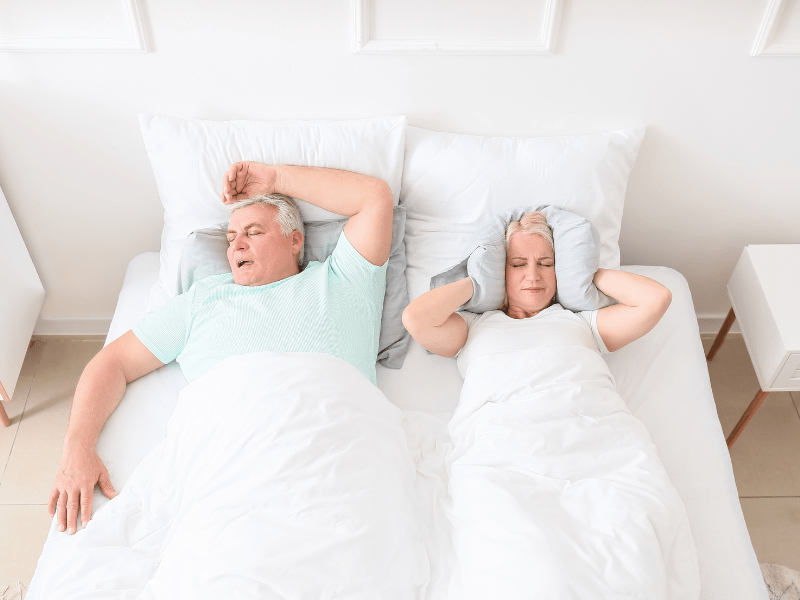Do you find yourself tossing and turning at night, plagued by stress? You're not alone—in fact, a recent study found that 77% of people experience increased stress levels that disrupt their sleep.
This blog post is here to help, offering practical strategies and simple tips to transform those restless nights into calm and restful sleep. Ready to dive in? The key to your peaceful slumber awaits below!
Understanding How Stress Affects Sleep
Stress has a significant impact on sleep, leading to symptoms of sleep anxiety and the importance of managing stress to improve sleep quality.
Sleep Anxiety: Symptoms and Causes
Sleep anxiety causes trouble at bedtime. It is a type of stress that can lead to lack of sleep or bad sleep quality. People with sleep anxiety often have their minds race with worries and fears when it's time to rest.
They may also feel panic attacks during the night. These symptoms could lead to insomnia, which is long-term trouble sleeping. Sometimes, medicine side effects cause sleep anxiety, too.
So, it's not just about your mind but also what you put in your body!
Importance of Managing Stress for Better Sleep
Stress makes it hard to sleep. Your body feels alert and awake when stressed, so you can't rest well. This is a big reason why some people roll around in bed for hours before they sleep.
Just like how not enough sleep can make stress worse, too much stress can lead to bad sleep. Good sleep helps your mind and body a lot! It boosts your mood and sharpens your thinking skills. If you manage stress well, your body will calm down at night time. Then you can fall asleep faster and wake up feeling fresh! Being less stressed also means fewer scary dreams or waking up many times in the middle of the night.
A calm mind leads to better quality sleep every time! So managing stress right doesn't only improve your days but also makes each night more peaceful and restful.
Tips for a Relaxing Bedtime Routine
Establish a consistent bedtime routine by engaging in activities that promote relaxation, such as stretching or practicing yoga, taking a warm bath or shower, enjoying a massage, or using relaxation techniques like deep breathing exercises and muscle relaxation.
Establishing a Routine
A good routine helps you get better sleep. Some steps for creating a helpful schedule are:
- Pick a bedtime. You need to go to sleep and wake up at the same time each day. This keeps your body's clock running well.
- Make your bedroom into a place for good sleep. It should be cool, dark, and quiet.
- Start winding down an hour before bed. Do relaxing things like reading or taking a warm bath.
- Keep lights low in the evening time so your body gets ready for rest.
- Leave screens out of the bedroom; they can keep you awake.
- Try calm activities before bed like drinking warm tea or doing easy yoga moves.
- If you have kids, set up a bedtime habit for them, too. This helps them learn how to get good rest.
- Remove stress from your life where you can so it does not mess with your sleep hours.
Creating a Sleep-Friendly Environment
A sleep-friendly environment is important for promoting a calm and restful night of sleep. Here are some tips to help you create an environment that is conducive to good sleep:
- Maintain a consistent sleep schedule: Going to bed and waking up at the same time every day helps regulate your body's internal clock and promotes better sleep.
- Establish a relaxing routine before bed: Engage in activities that help you unwind and relax, such as reading a book, taking a warm bath, or practicing gentle stretching exercises.
- Eliminate electronic devices from the bedroom: The blue light emitted by screens can disrupt your body's production of melatonin, a hormone that regulates sleep. Keep devices out of the bedroom to avoid temptation and promote better sleep quality.
- Ensure a quiet and dark bedroom: Use blackout curtains or eye shades to block out any unwanted light. Use earplugs or white noise machines to mask any disruptive sounds.
- Create a comfortable sleeping environment: Invest in a supportive mattress and pillows that suit your needs. Keep the room temperature cool and use breathable bedding materials.
Practicing Relaxation Techniques
Relaxation techniques can help you unwind and improve your sleep. Here are some tips to practice relaxation techniques for a more restful night:
- Try deep breathing exercises: Taking slow, deep breaths can help calm your mind and body. Inhale deeply through your nose, hold for a few seconds, then exhale slowly through your mouth.
- Practice meditation: Meditation involves focusing your attention and eliminating the stream of thoughts that may be causing stress or anxiety. Find a quiet place, sit comfortably, and concentrate on your breathing or repeat a calming phrase.
- Engage in rhythmic exercise: Activities like swimming, walking, or dancing to music can help reduce stress symptoms. These exercises promote relaxation by engaging both your mind and body.
- Explore yoga or tai chi: These mindful movement practices combine physical postures with deep breathing and meditation. They can help reduce stress, improve flexibility, and promote better sleep quality.
- Use guided imagery: Visualize yourself in a peaceful setting or imagine relaxing scenarios to shift your focus away from stressors. Close your eyes and create vivid mental images that evoke calmness and serenity.
Managing Stress and Anxiety for Better Sleep
Identify the sources of stress in your life and take steps to address them, whether it be through seeking professional help or making lifestyle changes.
Identifying Sources of Stress
Stress can impact your sleep, preventing you from getting the rest you need. To manage stress and improve your sleep quality, it's important to identify the sources of stress in your life. Here are some strategies to help you pinpoint what's causing stress and anxiety:
- Take note of daily stressors: Pay attention to the things that consistently make you feel stressed or anxious throughout the day.
- Reflect on major life events: Think about recent or ongoing events that may be contributing to your stress levels, such as work pressures, relationship issues, or financial concerns.
- Consider your environment: Assess how your surroundings may be affecting your stress levels. Noise, clutter, or discomfort can all contribute to feelings of stress and affect your ability to relax and unwind.
- Examine personal habits: Take a closer look at any habits or behaviors that may be adding to your stress levels. This could include poor time management, overcommitting yourself, or relying on unhealthy coping mechanisms like excessive caffeine or alcohol consumption.
- Keep a journal: Writing down your thoughts and emotions can help you identify patterns and triggers for stress. Regularly recording stressful situations or feelings can provide valuable insight into what areas of your life may need attention.
Seeking Professional Help
If stress and anxiety are interfering with your sleep, it may be time to seek professional help. Mental health professionals, such as therapists or counselors, can provide support and guidance in managing stress and finding healthy coping mechanisms.
They can also help you identify the sources of your stress and develop strategies for reducing its impact on your sleep. Cognitive behavioral therapy (CBT) and psychotherapy are commonly used approaches that have been proven effective in treating sleep disorders like insomnia, or even a shift work sleep disorder.
Remember, seeking professional help is an important step towards improving your emotional well-being and getting the restful sleep you need.
Avoiding Sleep-Disrupting Habits
Getting a good night's sleep is crucial for rest and rejuvenation. When you're trying to de-stress and improve your sleep, it's important to avoid habits that can disrupt your slumber. Here are some tips to help you steer clear of these sleep-disrupting habits:
- Limit alcohol consumption before bed: Alcohol may make you feel drowsy initially, but it can interfere with the quality of your sleep. It disrupts your REM (rapid eye movement) sleep, which is important for memory consolidation and learning.
- Cut back on caffeine intake: Consuming caffeine too close to bedtime can keep you awake and make it difficult for you to fall asleep. It's best to avoid caffeinated beverages like coffee, tea, and energy drinks at least 4-6 hours before bedtime.
- Quit smoking: Nicotine is a stimulant that can disrupt your sleep patterns. Smokers tend to experience less restful sleep compared to non-smokers. If you're having trouble quitting, seek professional help or explore nicotine replacement therapies.
- Create a technology-free zone in the bedroom: The blue light emitted by electronic devices like smartphones, tablets, and TVs can suppress the production of melatonin, a hormone that regulates sleep-wake cycles. Keep these devices out of your bedroom or use blue light filters to reduce their impact on your sleep.
- Don't eat heavy meals close to bedtime: Digesting a large meal can interfere with your ability to fall asleep peacefully. Try to have dinner at least 2-3 hours before going to bed and opt for lighter snacks if necessary.
Conclusion and Additional Resources
In conclusion, implementing practical strategies for managing stress can greatly improve the quality of your sleep. By establishing a relaxing bedtime routine, creating a sleep-friendly environment, and practicing relaxation techniques, you can stress-proof your sleep and enjoy a calm and restful night.
For more information and resources on managing stress and improving sleep, check out our recommended articles and websites listed below. Start your journey to better sleep today!
Better Sleep Starts Now: Expert Tips
If you want to improve your sleep, here are some expert tips that can help. First, make sure you have a consistent sleep schedule and stick to it every day. This helps regulate your body's internal clock and promotes better sleep.
Second, try to incorporate daily exercise into your routine. Physical activity can tire out your body and help you fall asleep faster at night. Third, spend time outdoors and get fresh air during the day.
This can help reduce stress and promote relaxation before bedtime. Lastly, avoid stimulants like nicotine and caffeine close to bedtime as they can disrupt your sleep patterns. By following these expert tips, you can start improving your sleep today for a more restful night ahead.
Useful Links for Managing Stress and Sleep
Stress and sleep are closely linked, and controlling one can greatly improve the other. To help you manage stress and get a better night's sleep, here are some useful resources.
|
Website |
Description |
|---|---|
|
A comprehensive guide that offers a variety of relaxation techniques for stress relief, which positively affects sleep quality and duration. |
|
|
Provides expert advice and tips on healthy sleep hygiene practices, which are essential for managing stress and obtaining quality sleep. |
|
|
This site identifies common sources of stress and provides various strategies for managing it, thus reducing its harmful effects on sleep. |
|
|
A trusted medical resource that offers advice on avoiding sleep-disrupting habits, recognizing the importance of sleep, and managing stress levels for a better night's rest. |
|
|
The CDC provides valuable information on the importance of sleep and its relationship with stress, offering tips on how to improve sleep habits. |
FAQs
1. How can I reduce stress to improve my sleep?
To reduce stress and promote a restful night's sleep, try incorporating relaxation techniques such as deep breathing, meditation, or gentle stretches before bedtime.
2. Can certain foods or drinks help with sleep and stress reduction?
Yes, consuming foods that are rich in nutrients like magnesium (such as almonds and leafy greens) or drinks like herbal tea (such as chamomile or lavender) can support better sleep and help manage stress.
3. Is exercise beneficial for reducing stress for better sleep?
Absolutely! Regular physical activity during the day helps to lower overall stress levels, which can contribute to improved sleep quality at night.
4. What is the ideal sleeping environment for a calm and restful night?
Creating a calming sleeping environment involves keeping your bedroom cool, dark, quiet, and comfortable by using blackout curtains or earplugs if necessary. Also consider removing electronic devices that emit blue light.
5. Are there any relaxation techniques I can use in bed to promote better sleep?
Yes! Try progressive muscle relaxation by tensing and then releasing each muscle group starting from your toes up to your head while lying in bed. Deep breathing exercises can also be helpful in promoting relaxation before falling asleep.



















